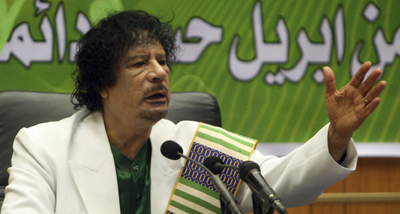An Egyptian blogger crosses red lines
When the Gulf War broke out in 1990, the world watched the horrors of conflict on live television. It caused a massive leap in media. When the Internet became widely accessible later that decade, the exchange of information in a single second signaled the dawn of another new age. News not only proliferated, it could…

An Iraqi journalist in America: Finally … Red Lobster
Most of the Iraqi refugees who recently arrived in America were shocked by the economic situation here. I was prepared. I knew about the difficulties of finding a job in America, and I knew I could count on assistance from the American government through my status as a journalist with The New York Times. Even…

Anniversary a reminder of Qaddafi’s media repression
As Col. Muammar Qaddafi, 67, celebrates the 40th anniversary of his ascent to power this week, it is unlikely that any of the numerous international guests will venture to ask the Libyan dictator or his aides what happened to journalist Abdullah Ali al-Sanussi al-Darrat after his arbitrary arrest 36 years ago. Al-Darrat, a journalist and…
After advocacy, Tunisian sees end of cruel punishment
The government’s cruel treatment of Tunisian journalist Abdallah Zouari came to an end on August 1, a reminder that even the most autocratic regimes will yield to international pressure for press freedom. Zouari, a former reporter for the now-defunct Islamic weekly Al-Fajr, had been forced to live under a form of house arrest since his…
Robert Mahoney writes about Egyptian bloggers in CJR
A piece in the Columbia Journalism Review raised questions about CPJ’s support of several bloggers in Egypt. The article draws a distinction between journalists who report facts and bloggers who deal in opinion and the promotion of causes. In a companion piece, CPJ Deputy Director Robert Mahoney argues that in a country like Egypt, where…

An Iraqi journalist in America: The other side of the war
It’s been more than three months since I realized one of my most important dreams by coming to the United States. Still, I never thought that I would come here as a refugee, maybe because my Iraqi dignity and pride simply wouldn’t accept such an idea.
Moroccan newsweeklies confiscated over royal poll
A bizarre case of press censorship arose recently in Morocco when authorities seized 100,000 copies of the country’s two leading newsweeklies–TelQuel and its Arabic-language sister publication, Nichane–after they published the results of a poll in which Moroccans were asked to assess their king. The odd part? Ninety-one percent of Moroccans said they found the rule…
Helping the Hikers
The notion that three American hikers could innocently wander across the border from Iraqi Kurdistan into Iran has elicited some understandable skepticism. But a statement from their friend who stayed behind in his hotel because he was ill helps explain how the situation unfolded.
Joel Simon on The New York Times’ “Room for Debate”
CPJ Executive Director Joel Simon is one of four diverse voices featured on The New York Times “Room for Debate” blog. The debate centers on the risk of venturing into dangerous territories, whether for recreation or journalism. You can read Simon’s take on the Times’ Web site.